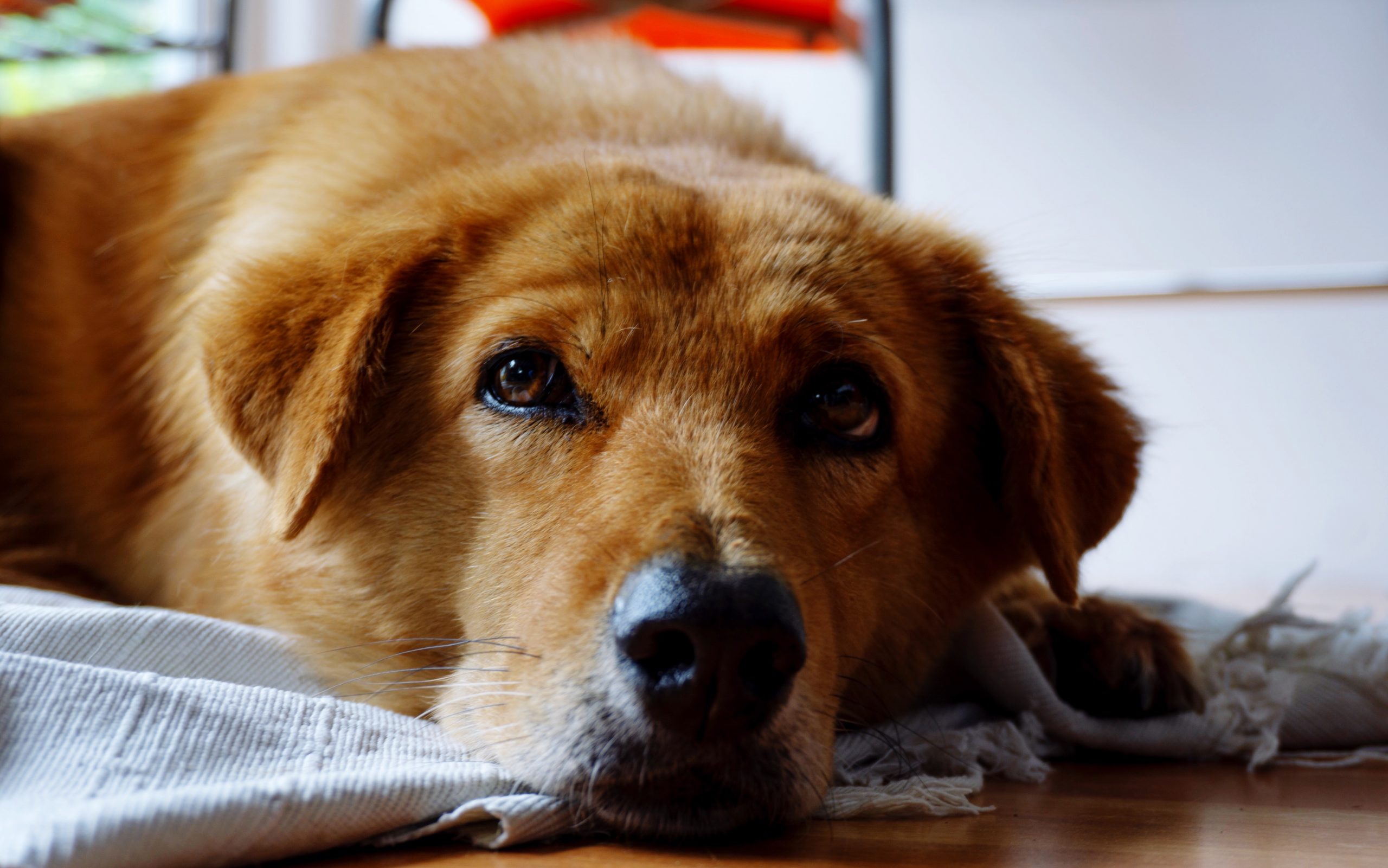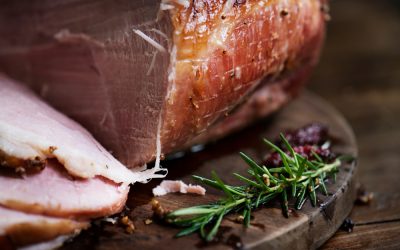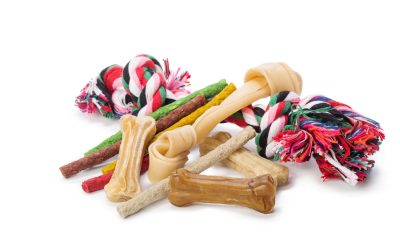Can Dogs Eat Chicken Bones?

Updated November 15, 2025
We’ve all been there, one second you’re clearing plates, the next, your dog has snuck off with a chicken bone. Before panic sets in, take a deep breath. While chicken bones can pose serious risks to dogs, staying calm and knowing what to do next makes all the difference.
While chicken bones can pose serious risks to dogs, staying calm and knowing what to do next makes all the difference in protecting your furry friend.
In this article, we’ll break down the dangers of cooked chicken bones, explain the differences between raw and cooked bones, and share practical tips to help you keep your dog safe. If you ever find yourself in this situation, remember: seek veterinary attention immediately to protect your pet’s health and give them the best chance at a full recovery.
Understanding the Real Risks: Why This Matters
When it comes to dogs and chicken bones, the risks are real and should never be underestimated, though we don’t want to alarm you unnecessarily. Many dogs are quick to snatch up food scraps, and if your dog ate chicken bones, whether by accident or on purpose, it can lead to serious health problems that require immediate attention. Cooked chicken bones, in particular, can splinter and cause internal bleeding or damage to your dog’s gastrointestinal tract, sometimes with life-threatening consequences.
Why Chicken Bones Can Be Dangerous for Dogs
At first glance, a chicken bone might not seem like a big deal. However, once cooked, chicken bones become brittle and can easily splinter, transforming from a simple food scrap into a serious hazard. When dogs eat chicken bones, bone splinters can injure your dog’s mouth and oral cavity, causing pain, bleeding, or even infection that requires veterinary treatment.
Those sharp fragments can cause trouble in multiple ways, including choking, cuts in the mouth, or injuries further down the digestive tract that you can’t see but are just as dangerous. Dogs are curious scavengers by nature (and let’s be honest, expert snack thieves who can spot an unattended plate from across the room). Whether it’s from the trash, the ground, or an unattended plate during a family dinner, it’s not uncommon for them to grab something they shouldn’t.
Cooked chicken bones also pose a significant choking hazard, as splinters or fragments can block the airway and cause your beloved pet to struggle for breath. Knowing the risks can help you respond quickly and effectively if it ever happens, potentially saving your dog’s life.
What Happens When Your Dog Eats a Chicken Bone?
If your dog swallowed a chicken bone, the outcome can vary significantly. Some dogs may pass the bone with no issues at all, while others may not be so fortunate.
Splintering:
Cooked bones can break into sharp bone pieces that scrape or puncture the mouth, throat, or intestines, causing internal injuries that aren’t immediately visible but are extremely painful for your furry friend.
Blockages:
A larger bone or multiple fragments can get stuck in the stomach or intestines, leading to a gastrointestinal blockage. This poses a potential risk to your dog’s digestive system and stomach, possibly requiring urgent surgical intervention to remove the obstruction.
Infection or irritation:
Even small pieces can cause inflammation or introduce bacteria into the digestive system, putting internal organs at risk and potentially causing sepsis or other serious complications.
We want to emphasize that certain actions, such as inducing vomiting, can cause more harm than good if not done under veterinary supervision, so please don’t attempt home remedies without professional guidance.
Signs Your Dog Might Be in Discomfort
Your dog can’t exactly tell you they’re hurting, but their body language speaks volumes if you know what to look for. After eating a bone, closely monitor your dog’s behavior and note if your dog appears distressed or in pain. These symptoms warrant immediate veterinary attention for the safety of your beloved companion.
- Coughing, gagging, or retching
- Drooling more than usual
- Vomiting or lack of appetite
- Pawing at their mouth
- Lethargy or restlessness
- Visible discomfort or abdominal pain
- Blood in their stool or trouble going to the bathroom

What to Do Right Away
- Stay calm. Your pups take their emotional cues from you, so staying cool helps them stay calm, too.
- Check their mouth gently. Look for any bone pieces stuck in their mouth, teeth, or throat. If the bone is still in their mouth and you can safely remove it without pushing it further back, great. But don’t reach too far in or risk injury to yourself or your dog.
- Don’t induce vomiting unless your veterinarian tells you to. Inducing vomiting can sometimes make things worse, especially if the bone is sharp, and it may not be the best course of action without professional advice guiding you.
- Limit movement. Try to keep your dog relaxed and quiet to reduce the risk of internal damage from bone fragments moving through their system.
- Call your vet immediately. Every dog and situation is different, and only a professional can assess your specific circumstances. A quick phone call can help you figure out whether your dog needs to be seen right away or just monitored carefully at home. If your dog develops symptoms or you are unsure, seek immediate medical attention or veterinary help.
What Veterinarians Recommend If Your Dog Eats Chicken Bones
As veterinarian Sandra C. Mitchell, DVM, DABVP explained in the PetMD article, there are some steps you can take at home: “Feeding your dog a few slices of plain white bread, a soft piece of bread, or soft food right after ingestion can help to coat the bone and hopefully prevent harm from any sharp edges.”
You can also offer bone broth to help soothe the digestive tract and provide comfort to your worried pet. Feeding soft foods can stimulate the production of gastric juices, which may help break down bone fragments and facilitate their passage through the digestive system.
Keep a very close eye on your dog and make sure they don’t develop any signs of illness. Symptoms such as choking, vomiting, and diarrhea can be life-threatening and require immediate intervention.
If your pup begins to exhibit any symptoms or is a puppy with a more vulnerable system, seek veterinary attention immediately without hesitation..
What To Do if Your Dog Chokes on a Chicken Bone
If you are concerned that the bone is stuck in the upper airway or the upper intestinal tract, especially if it is lodged in your dog’s throat and causing choking, this is an emergency and should be addressed immediately.
If you can see or grasp the bone safely, you should do so carefully. However, be mindful not to stress your pup out further or push the bone deeper. If the bone is not immediately visible, take your pup to the veterinarian immediately, as obstructions can prevent food from passing through the digestive tract and may require urgent intervention.
As a rule, don’t feed bones to your dog at all, and don’t allow your pup any access to them to prevent these terrifying situations. First aid techniques for choking may differ for small dogs and larger dogs, so be sure to use the appropriate method for your dog’s size and familiarize yourself with these techniques before an emergency occurs.
When It’s Time to Call the Vet
It’s always best to play it safe when it comes to your beloved companion’s health. If you notice any of these signs, seek veterinary help and reach out to your vet right away without delay:
Persistent vomiting that continues for more than an hour, trouble breathing or swallowing that indicates a potential obstruction, bloody stool or diarrhea showing internal injury, excessive drooling that seems abnormal, lethargy with shaking or clear signs of pain, and no bowel movements within 24 to 48 hours indicating a potential blockage.
We cannot stress enough: when in doubt, call your veterinarian.
How to Prevent It from Happening Again
We can take a few simple steps to avoid chicken bone mishaps in the future:
- Use pet-proof trash bins (especially after dinner parties or holidays).
- Keep plates and food out of reach—even for a moment.
- Teach cues like “leave it” or “drop it” to stop scavenging in its tracks.
- Let guests know not to slip your dog any bones under the table, no matter how cute those eyes are!
Safe Chewing Alternatives for Your Dog
If your pup loves to chew and needs that outlet, offer safer options instead of table scraps that could harm them. When a pup chews on cooked or inappropriate bones, such as cooked chicken bones, there is a high risk of splintering, internal injuries, or choking hazards. Some great choices include:
- Durable rubber or nylon toys made specifically for chewing that can withstand your dog’s powerful jaws
- vet-approved raw bones given only after consulting with your veterinarian first about safety
- dental chews that clean teeth while satisfying that natural urge to gnaw.
How Can Pet Insurance Help You If Your Dog Has Eaten A Chicken Bone?
Dealing with a dog who has eaten a chicken bone can be financially burdensome, especially if complications arise and require veterinary care. Having pet insurance can provide you with peace of mind and help alleviate the financial stress associated with unexpected medical expenses.
Pet insurance may cover a portion of veterinary costs, including diagnostic tests, medications, surgeries, and hospitalizations. With pet insurance, you can focus on providing the best care for your furry friend without worrying about the financial implications.
Depending on the specific policy, pet insurance can cover the diagnosis, treatment, and management of diseases in cats.
Reimbursement
This method is the most common for pet insurance companies. You pay out of pocket for the veterinarian bill, and then the insurance company reimburses you for what’s covered under the insurance plan. The steps look like this.
- You pay the vet bill after your cat’s visit.
- You fill out the pet insurance claim form.
- Submit the claim form and other required documentation to the insurer.
- After the claim is approved, you will be reimbursed for eligible expenses.
Odie’s Illness and Injury pet health insurance plan offers comprehensive coverage for your cat.
What Does Odie Pet Insurance Cover?
Pet insurance covers various veterinary expenses, providing financial protection and peace of mind for pet owners. Here are the details of the coverage options offered by Odie Pet Insurance:
Illness & Injury Plan
The Illness & Injury Plan is an all-inclusive insurance plan designed to cover a wide range of medical needs for your pet. This plan includes comprehensive coverage for various illnesses, injuries, and veterinary services. Some of the covered items include:
- Veterinary exams and consultations
- Diagnostics (e.g., X-rays, lab tests)
- Prescribed medications
- Surgeries and hospitalization
- Rehabilitation, acupuncture, or chiropractic treatments
- Medically necessary supplies
The Wellness Plan
The Wellness Plan is a monthly membership that focuses on preventive care and covers routine veterinary services.
- Provides reimbursements for routine care items such as wellness visits (exams and vaccines), testing and parasite prevention, dental cleanings and at-home dental care, vitamins, supplements, and more.
- Through Odie’s partnership with Petivity, a leader in smart pet products and proactive care, Wellness Plan members can also receive reimbursements for Petivity devices and health kits, as well as eligible Purina food and supplements.
- Total reimbursement up to $700 per year.



